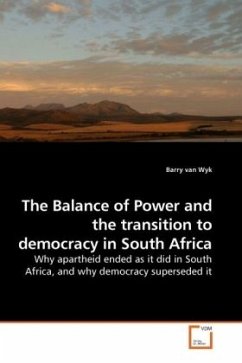This is a study of the transition to democracy in South Africa. It delineates South Africa s transition as the ultimate consequence of the clash between the enforced political constructs of apartheid and the inexorably prevailing economic realities in South Africa. Apartheid was implemented from 1948 in order to impose strictly political measures above the general economic concerns of South Africa. Yet this induced sustained structural economic crisis, especially from the 1970s. The growing consensus of the 1980s advocating the primacy of negotiations and the excruciating process of negotiations in the early 1990s, however, would lead the ANC to jettison its own interventionist policies, while the NP would abandon its insistence on minority rights. In 1994 a governmental environment prevailed in South Africa intent on addressing the needs of the South African economy as its prime policy objective. This epoch is enunciated in the study as the economic balance of power. Taken together, the economic balance of power and the antecedent political balance of power form two interlocking elements of the balance of power, illuminating South Africa s transition from apartheid to democracy.
Bitte wählen Sie Ihr Anliegen aus.
Rechnungen
Retourenschein anfordern
Bestellstatus
Storno








